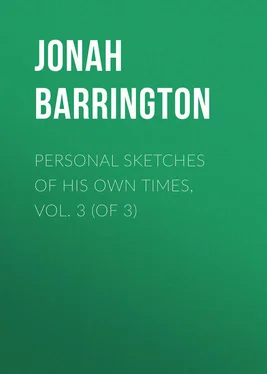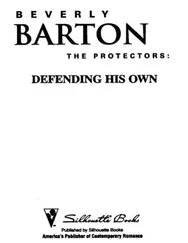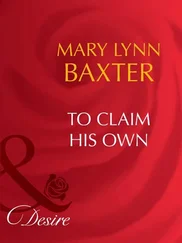Jonah Barrington - Personal Sketches of His Own Times, Vol. 3 (of 3)
Здесь есть возможность читать онлайн «Jonah Barrington - Personal Sketches of His Own Times, Vol. 3 (of 3)» — ознакомительный отрывок электронной книги совершенно бесплатно, а после прочтения отрывка купить полную версию. В некоторых случаях можно слушать аудио, скачать через торрент в формате fb2 и присутствует краткое содержание. Жанр: foreign_antique, foreign_prose, на английском языке. Описание произведения, (предисловие) а так же отзывы посетителей доступны на портале библиотеки ЛибКат.
- Название:Personal Sketches of His Own Times, Vol. 3 (of 3)
- Автор:
- Жанр:
- Год:неизвестен
- ISBN:нет данных
- Рейтинг книги:4 / 5. Голосов: 1
-
Избранное:Добавить в избранное
- Отзывы:
-
Ваша оценка:
- 80
- 1
- 2
- 3
- 4
- 5
Personal Sketches of His Own Times, Vol. 3 (of 3): краткое содержание, описание и аннотация
Предлагаем к чтению аннотацию, описание, краткое содержание или предисловие (зависит от того, что написал сам автор книги «Personal Sketches of His Own Times, Vol. 3 (of 3)»). Если вы не нашли необходимую информацию о книге — напишите в комментариях, мы постараемся отыскать её.
Personal Sketches of His Own Times, Vol. 3 (of 3) — читать онлайн ознакомительный отрывок
Ниже представлен текст книги, разбитый по страницам. Система сохранения места последней прочитанной страницы, позволяет с удобством читать онлайн бесплатно книгу «Personal Sketches of His Own Times, Vol. 3 (of 3)», без необходимости каждый раз заново искать на чём Вы остановились. Поставьте закладку, и сможете в любой момент перейти на страницу, на которой закончили чтение.
Интервал:
Закладка:
Doctor Sir Charles Morgan has given us, at the conclusion of his lady’s excellent work “Italy,” the state of “medicine” in that country. Our old cookery books, in like manner, after exquisite receipts for all kinds of dainties, to suit every appetite, generally finished a luxurious volume with remedies for the “bite of a mad dog – for scald heads – ague – burns – St. Anthony’s fire – St. Vitus’s dance – the tooth-ache,” &c. &c. Now, though the Doctor certainly did not take the cooks by way of precedent, that is no reason why I should not indulge my whim by citing both examples, and garnishing this volume with “the state of medicine in Ireland” fifty years ago.
I do not, however, mean to depreciate the state of medicine in these days of “new lights” and novelties, when old drugs and poisons are nicknamed , and every recipe is a rebus to an old apothecary. Each son of Galen now strikes out his own system; composes his own syllabus; and finishes his patients according to his own proper fancy. When a man dies after a consultation (which is generally the case – the thing being often decided by experiment ) – there is no particular necessity for any explanation to widows, legatees, or heirs-at-law; the death alone of any testator being a sufficient apology to his nearest and dearest relatives for the failure of a consultation – that is, if the patient left sufficient property behind him.
My state of Irish medicine, therefore, relates to those “once on a time” days, when sons lamented their fathers, 4 4 In these times it may not, perhaps, be fully credited when I tell – that four of my father’s sons carried his body themselves to the grave: that his eldest son was in a state bordering on actual distraction at his death; and in the enthusiastic paroxysms of affection which we all felt for our beloved parent at that cruel separation, I do even now firmly believe there was not one of us who would not, on the impulse of the moment, have sprung into, and supplanted him in his grave, to have restored him to animation. But we were all a family of nature and of heart, and decided enemies to worldly objects.
and wives could weep over expiring husbands; when every root and branch of an ancient family became as black as rooks for the death of a blood relation, though of almost incalculable removal. In those times the medical old woman and the surgeon-farrier – the bone-setter and the bleeder – were by no means considered contemptible practitioners among the Christian population – who, in common with the dumb beasts, experienced the advantages of their miscellaneous practice.
An anatomical theatre being appended to the University of Dublin, whenever I heard of a fresh subject, or remarkable corpse, being obtained for dissection, I frequently attended the lectures, and many were the beauteous women and fine young fellows then carved into scraps and joints pro bono publico . 5 5 I never saw a young woman brought into the dissecting-room but my blood ran cold, and I was immediately set a-moralising. The old song of “Death and the Lady” is a better lecture for the fair sex than all the sermons that ever were preached, including Mr. Fordyce’s. ’Tis a pity that song is not melodised for the use of the fashionables during their campaigns in London.
I thereby obtained a smattering of information respecting our corporeal clockwork; and having, for amusement, skimmed over “Cullen’s First Lines,” “Every Man his Own Doctor,” “Bishop Berkeley on Tar Water,” and “Sawny Cunningham on the Virtues of Fasting Spittle,” I almost fancied myself qualified for a diploma. A Welsh aunt of mine, also, having married Doctor Burdet, who had been surgeon of the Wasp sloop of war, and remarkable for leaving the best stumps of any naval practitioner, he explained to me the use of his various instruments for tapping, trepanning, raising the shoulder-blades, &c. &c.: but when I had been a short time at my father’s in the country, I found that the farriers and old women performed, either on man or beast, twenty cures for one achieved by the doctors and apothecaries. I had great amusement in conversing with these people, and perceived some reason in their arguments.
As to the farriers, I reflected, that as man is only a mechanical animal, and a horse one of the same description, there was no reason why a drug that was good for a pampered gelding might not also be good for the hard-goer mounted on him. In truth, I have seen instances where, in point both of intellect and endurance, there was but very little distinction between the animals – save that the beverage of the one was water , and that of the other was punch – and, in point of quantity , there was no great difference between them in this matter either.
At that time there was seldom more than one regular doctor in a circuit of twenty miles, and a farrier never came to physic a gentleman’s horse that some boxes of pills were not deducted from his balls, for the general use of the ladies and gentlemen of the family; and usually succeeded vastly better than those of the apothecary.
The class of old women called colloughs were then held in the highest estimation, as understanding the cure (that is if God pleased) of all disorders. Their materia medica did not consist of gums, resins, minerals, and hot iron, – as the farriers’ did; but of leaves of bushes, bark of trees, weeds from churchyards , and mushrooms from fairy grounds ; rue, garlic, rosemary, birds’-nests, foxglove, &c.: in desperate cases they sometimes found it advisable to put a charm into the bolus or stoop, and then it was sure to be “firm and good.” I never could find out what either of their charms were. They said they should die themselves if they disclosed them to any body. No collough ever could be a doctor whilst she had one tooth remaining in her head, as the remedy was always reduced to a pulp or paste by her own mumbling of its materials, and the contact of an old grinder would destroy the purity of the charms and simples, and leave the cure, they would say, no better than a farrier’s.
Our old collough, Jug Coyle, as she sat in a corner of the hob, by the great long turf fire in the kitchen, exactly in the position of the Indian squaws, munching and mumbling for use an apron-full of her morning’s gatherings in the fields, used to talk at intervals very sensibly of her art. “Ough! then, my dear sowl, (said she one evening,) what would the poor Irishers have done in owld times but for their colloughs? Such brutes as you!” continued she, (looking at Butler, the farrier of the family, who was seated fast asleep on a bench at the opposite end of the hearth,) “’tis you, and the likes of you, a curse on you, root and branch! that starved the colloughs by giving your poisons to both cows and quality. Sure its the farriers’ and pothecaries’ drugs that kills all the people-ay, and the horses and cattle too,” and she shook her claw-like fist at the unconscious farrier.
“Jug Coyle,” said I, “why are you so angry?”
Jug: – “Sure it’s not for myself, it’s for my calling,” said she: “a thousand years before the round towers were built (and nobody can tell that time), the colloughs were greater nor any lady in the country. We had plenty of charms in those days, Master Jonah, till the farriers came, bad luck to the race! Ough! may the curse of Crummell light on yees all, breed, seed, and generation, Larry Butler! not forgetting Ned Morrisy of Clapook, the villanous cow-doctor, that takes the good from the colloughs likewise, and all – ”
Here Jug Coyle stopped short, as the farrier opened his eyes, and she knew well that if Larry Butler had a sup in, he would as soon beat an old woman as any body else. She therefore resumed munching her herbs, but was totally silenced.
Читать дальшеИнтервал:
Закладка:
Похожие книги на «Personal Sketches of His Own Times, Vol. 3 (of 3)»
Представляем Вашему вниманию похожие книги на «Personal Sketches of His Own Times, Vol. 3 (of 3)» списком для выбора. Мы отобрали схожую по названию и смыслу литературу в надежде предоставить читателям больше вариантов отыскать новые, интересные, ещё непрочитанные произведения.
Обсуждение, отзывы о книге «Personal Sketches of His Own Times, Vol. 3 (of 3)» и просто собственные мнения читателей. Оставьте ваши комментарии, напишите, что Вы думаете о произведении, его смысле или главных героях. Укажите что конкретно понравилось, а что нет, и почему Вы так считаете.












